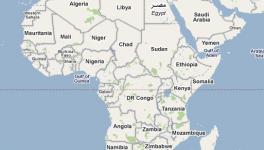Quit Gaddafi Quit!
What will it take to coerce Muammar Gaddafi to relinquish power?
As I pen these thoughts, on the 28th of February, 2011, media channels are reporting that Gaddafi has lost control over large swathes of his country of 6.4 million people. The popular uprising against his 41 year-old rule has spread rapidly from Benghazi, Libya’s second largest city, to the outskirts of the capital, Tripoli, Gaddafi’s last bastion.
Rather than surrender to the people’s will, the erratic despot has chosen to cling on to the last vestige of power abetted by elements in the armed forces, his special security units, mercenaries imported from various countries, and of course, his family members. In this regard, it is significant that a large number of senior military personnel, civilian administrators, cabinet ministers and diplomats have already defected to the side of the protesters. It is partly because of the defection of military personnel that many protesters are now armed to the teeth. Consequently, there have been bloody battles between pro and anti Gaddafi groups in various parts of Libya. The United Nations estimates that at least 2000 people have died in what is, to all intents and purposes, a civil war.
The UN Security Council has unanimously agreed to impose travel and asset sanctions on Gaddafi and his close aides. It has also adopted an arms embargo and referred the ruling elite to the International Criminal Court (ICC) for investigation and prosecution for the killing of civilians. These are moves targeted at Gaddafi and his coterie, as they should be, and will not hurt the general populace.
If these measures do not work, past and present heads of state and government who are known to be on friendly terms with Gaddafi should try to persuade him to stop killing his people and to step down. The President of Venezuela, Hugo Chavez, Turkish Prime Minister, Recep Erdogan, Italian Prime Minister, Silvio Berlusconi, and the former British Prime Minister, Tony Blair, are some possibilities.
Gaddafi may have to be assured that if he heeds the people’s wishes immediately, they may still remember him for some of his outstanding accomplishments in the first two decades of his rule --- accomplishments such as the closure of the huge American air-base in Libya in 1970; his nationalisation of oil; the pivotal role he played in the re-organisation of the Organisation of Petroleum Exporting Countries (OPEC) which enabled it to emerge as a powerful cartel challenging Western dominance over the oil industry; his massive man-made river project to irrigate desert land; his housing schemes for the low-income segment of society; and other infrastructure programmes.
But right from the outset--- the rhetoric about decentralisation of authority and the establishment of grassroots’ revolutionary committees and congresses notwithstanding--- Gaddafi adopted a highly personalised, autocratic approach to power. He was synonymous with the State. Organised state structures with their own authority just could not emerge under his autocratic rule. This is why I suppose he once boasted that Libya was the first society in history where the state had withered away! One of the consequences of this was the chaos that prevailed at various levels of society, a bit of which I experienced when I was in Tripoli in April 1980 for lectures that did not take place.
Personalised, autocratic rule gave rise to mammoth corruption and nepotism. Given Libya’s huge oil wealth, one is not surprised--- in the absence of any notion of accountability and transparency--- why this twin evil flourished. By the late nineties, Gaddafi’s family was so deeply entrenched in the vortex of power that the approval of one of his sons or daughter had become mandatory for all major business deals, at the domestic and international levels. The family’s business interests may be one of the reasons why Gaddafi is hell-bent on remaining in power.
This brings us back to the question I posed at the beginning. If Gaddafi
refuses to leave in spite of UN Security Council resolutions and advice from his friends, what other option is available? Some American political leaders like John McCain, Joseph Lieberman and Paul Wolfowitz have suggested direct NATO military intervention. This would be foolish as it is dangerous. Military action on the part of the US and Europe will revive painful memories of Western colonialism and neo-colonial designs against Libya. It will only strengthen Gaddafi’s hand and undermine the legitimacy of the anti-Gaddafi struggle. NATO military intervention which will lead inevitably to occupation will have a catastrophic impact upon the Arab uprising as a whole that is still unfolding in various parts of the region.
Besides, the people in the region will see through the stark hypocrisy of such intervention. If protecting lives is their concern, why is it that no Western power lifted a finger to save the Palestinians of Gaza when the Israeli army was slaughtering a defenceless population in January 2009? If the US and Britain are so traumatised by the killing of civilians, why did they invade Iraq in 2003, an invasion which subsequently led to the massacre of hundreds of thousands of innocent Iraqis?
It is obvious that it is not Libyan lives that the likes of McCain, Lieberman and Wolfowitz want to save. If military action is being contemplated, it is mainly because the centres of power in the West are fixated upon Libya’s oil. Next to Saudi Arabia, Libya is the major supplier of oil to Europe. The current turmoil in Libya has already pushed up the price of the commodity to 108 US dollars a barrel. Market analysts fear that if the flow of oil from Libya stops, oil prices may hit 200 dollars a barrel. This will have severe repercussions for the industrialised economies of the West and economies everywhere.
It has also been argued that compared to other important oil-exporting countries, only about 60% of Libya’s oil wealth has been exploited so far. This enhances its attractiveness for those who seek to control global oil in order to perpetuate their global hegemony.
This is yet another compelling reason--- the protection of the sovereignty of his own nation--- why Gaddafi should quit immediately. It would be ironic if because of his stubbornness he unwittingly opens the door to some nefarious neo-colonial intruder. The Libyan and Arab people, and indeed all those who cherish their freedom and independence, will not forgive Gaddafi.
Dr. Chandra Muzaffar is the President of the International Movement for a Just World (JUST) and Professor of Global Studies at Universiti Sains Malaysia.
Get the latest reports & analysis with people's perspective on Protests, movements & deep analytical videos, discussions of the current affairs in your Telegram app. Subscribe to NewsClick's Telegram channel & get Real-Time updates on stories, as they get published on our website.
























